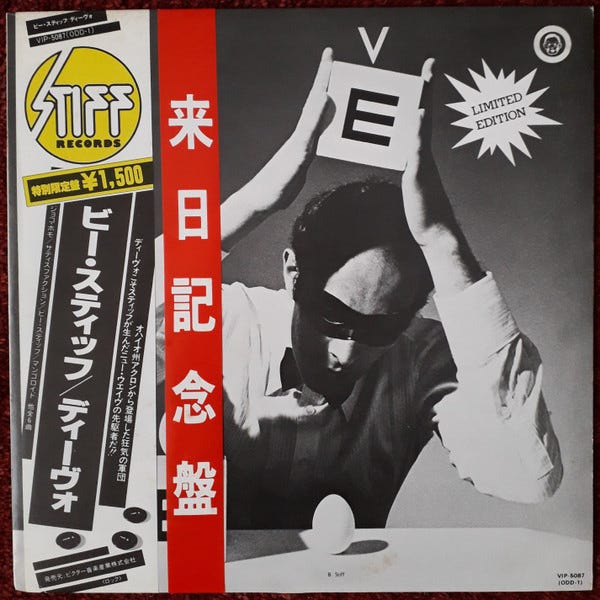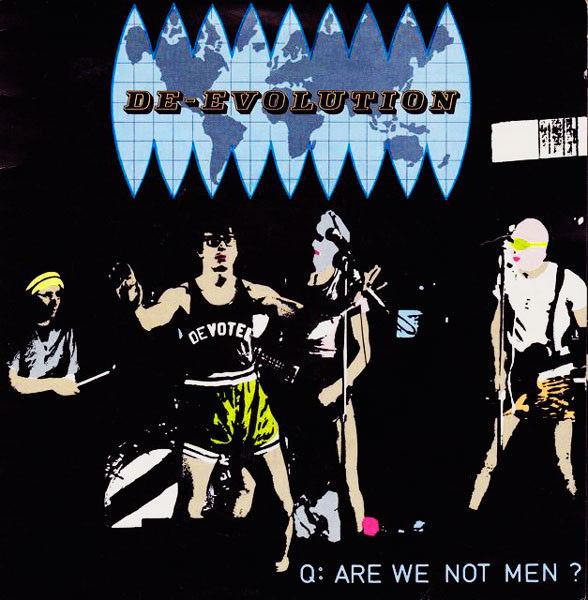In 1977 I was very much a lost soul. Twelve months earlier, I lost a parent. I was dealing with the implications of being without a father and getting used to having only a mom. My love for music was getting intense, and I threw myself into the local Los Angeles punk scene, especially with bands such as The Screamers. Still, I took a trip to Bomp Records in the San Fernando Valley, the best punk rock record store at that time. I greatly admire the store because they had local punk recordings and records from New York and London in stock. It was a time when one couldn’t quickly get recordings from that world, so Bomp was truly heaven-sent. I was intrigued by a 45 rpm single Mongoloid / Jocko Homo at the record shop by DEVO.
Due to the record sleeve, I was hooked when I got home and heard this single. I was impressed by the Mono sounding of the recording. The industrial aspect of their sound was machine-like and brutal to my ears. I played it at least once a day or maybe twice, but it became my soundtrack of choice. When I read that they would be at The Starwood in West Hollywood, how could I not go? I went there with my friend Gary, and there were six people in the audience. Two of them were Iggy Pop and the other Toni Basil, who was a friend. What we saw was probably the most dynamic and intense presentation. Even to this day, thinking back, I can still feel the goosebumps on my arms from their performance. What was amazing was their intensity and focused energy on the stage. They reminded me of James Brown and his Fabulous Flames on the T.A.M.I Show. Their assembly-line performance has gone amok, driven by the sound and choreographed dance steps tight as a wrapped around rubber band that is about to snap back. Beyond that, I was highly impressed with their drummer Alan Myers, who I thought may have been a robot doing a perfect beat for a second or two. The late and great Alan was one of the great drummers of the 20th-century.
I can’t remember if I met them that night or at a later event with Toni Basil, but we all became friends. This means I was devoted to seeing every show they presented in Los Angeles. And not one show was ever even close to a stinker. They have decided to move from Ohio to Los Angeles somewhere down the line. So, they became very much part of the punk rock scene in Los Angeles. They did interviews in Slash magazine and San Francisco’s Search and Destroy. They were a band with a philosophy of being an art movement, with even contributions to films and the visual world, primarily due to their lead singer and co-writer Mark Mothersbaugh, a visual artist. As a 21-year old fellow, I was highly impressed with their presence in the scene. Here, I thought, was the new sound for the new era that would take place. I often thought of the Punk movement as Ground Zero. Everything before Punk will be destroyed, and out of the ashes came DEVO. Well, that is what I believed would happen.
Instead, they became very successful with the American label Warner Brothers and Virgin Records in the UK. Even when they made a record for an indie label, it was the iconic Stiff Records. In other words, my hopes that they would have their label and distribution system in place was nothing but a fantasy. When I listened to interviews, they wanted to be independent of the music world and do their part in their manner and ways. Never would I think that they would become part of the Showbiz machinery. It seems everything they have said, they did the opposite, and I was disappointed that they were not a force by themselves. Still, the songs were great, if though, very male-orientated. Although they appeared nerdy, there was a robust male aspect to their presentation. At times, it made me feel uncomfortable. But that’s OK; art is supposed to make one feel uncomfortable.
Stiff Records put out an EP B Stiff, a compilation of their early singles before signing with Virgin/Warner Brothers. Only the tune Be Stiff is produced by an outsider, Brian Eno. The rest were self-produced and made in Ohio, except for their version of The Rolling Stones’s I Can’t Get Me No, Satisfaction. Gary Friedlander, on his 4-track recorder, recorded Satisfaction. For me, this was DEVO at its purest level of art music-making. What sounded like, in theory, or on paper as an excellent idea of having Eno produce their debut Warner /Virgin Records in Conny Plank’s studio in Germany became a product very much without a soul.
Most would consider the first DEVO album Q: Are We Not Men? A: We are DEVO! as a masterpiece, but to me, it was a disappointment on different levels. For one, and they perhaps had their good and logical reasons to do so, but they sold out to their principal idea of being independent of the music world. They signed up with Bowie, and the Eno world, which of course, is attractive to a young band. But a group with a high sense of aesthetic and what I thought was strong independence from their surroundings. Alas, this was only an illusion. I truly wanted a DEVO-Land, where they exist without the outside music industry world. I was naive, but I wanted them to be in the same league as Kraftwerk, who struck me as a force of nature within the music-world structure.
DEVO was the first band where I thought rock music was changed structurally geared to the artist and their vision. Over time, I see DEVO feeding the music industry machine instead of providing their greatness. They became another ‘New Wave” act, and that was the end. Now, the very thought of independence being struck in the music showbiz world is a foreign concept. It doesn’t exist. B Stiff is a brief entrance to the greatness they quickly pissed away in future DEVO releases. However, they must have known because they had released their early demo/studio and live recordings throughout the years before Warner Brothers got them entangled in their web. One thing for sure, Alan Myers was the band's soul, and once he left, DEVO became an illusion. I look back at that illusion and remember a time of great promise, but alas, DEVO turned into a disposable clog in the music industry machinery. Like all clogs, it becomes an irritant and then becomes meaningless. Still, my moments as a fan of DEVO will stay with me. Life tends to move like a river, but sometimes a Damn or pollution blocks the flow, and we have to dance around the mess.





Great! Mothersbaugh did a Marc Maron podcast where he talks about those very early days. Including playing at CBGB with John Lennon in the audience. After the show, Lennon gets in MOthersbaugh's face and yells, "Yeah, Yeah, Yeah, Yeah, Yeah, Yea!!!"
Man I would give a whole lot to jump into a time machine to be one of the six people at that Starwood show!!